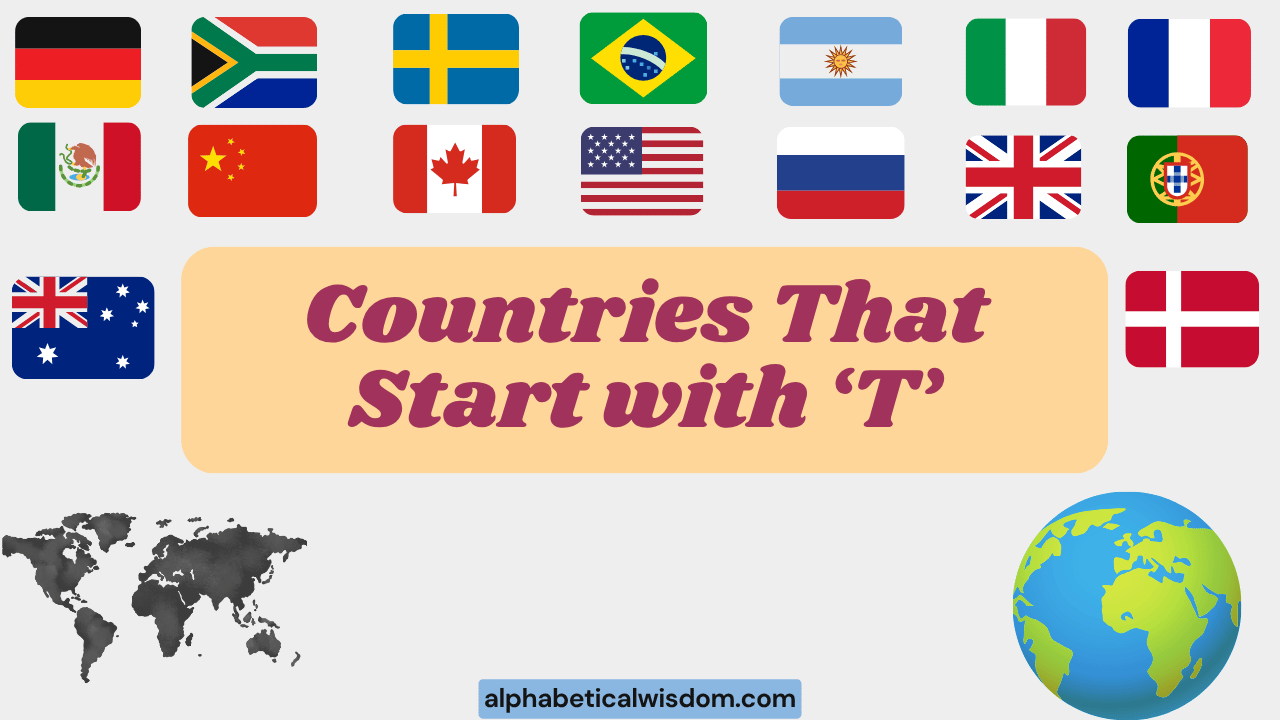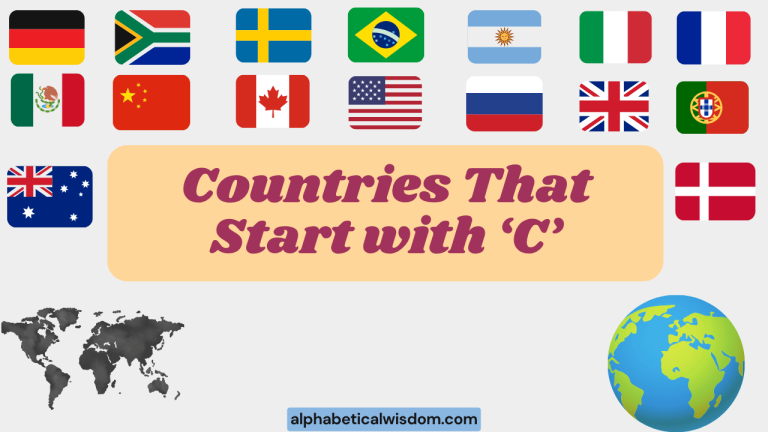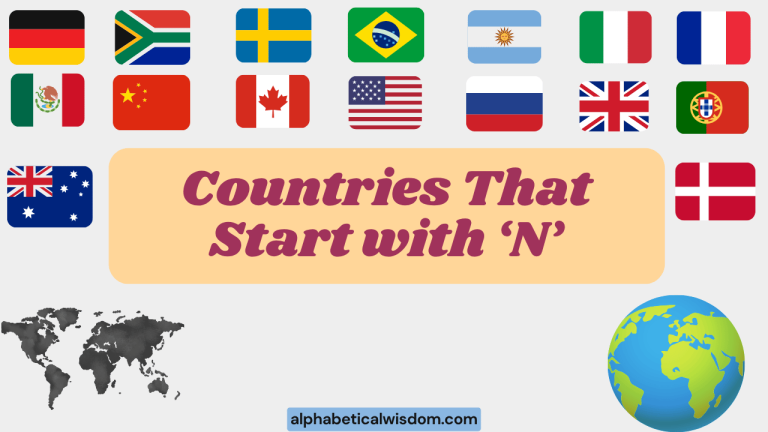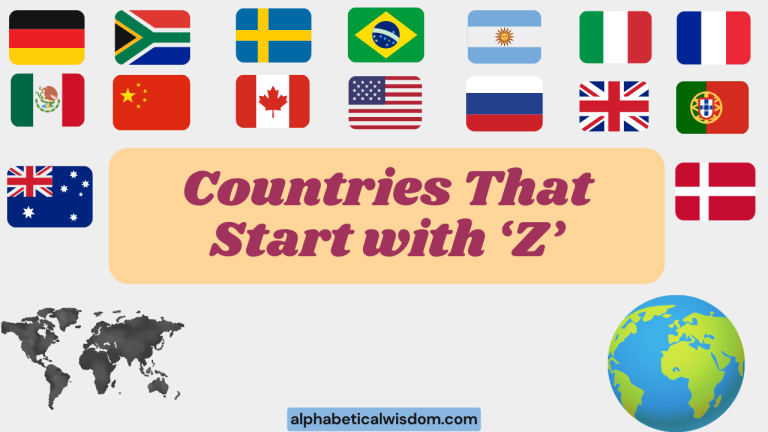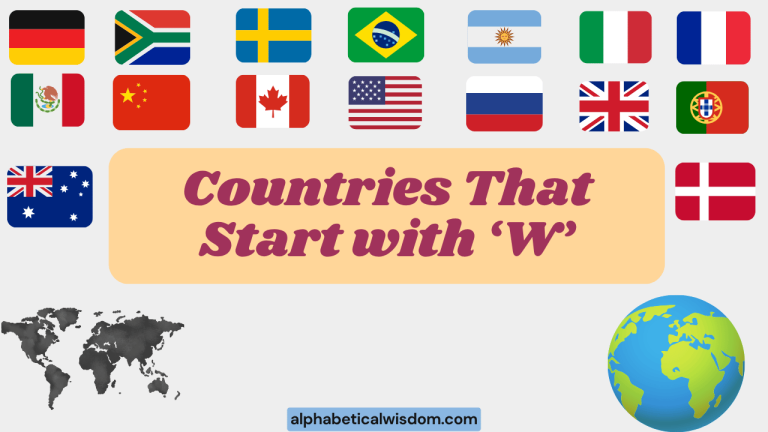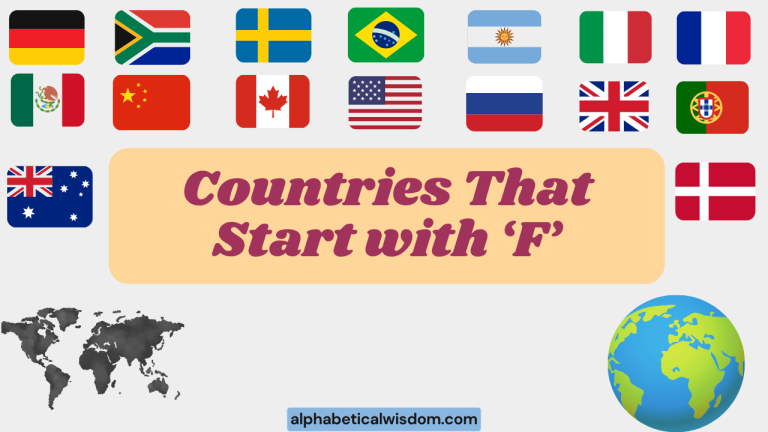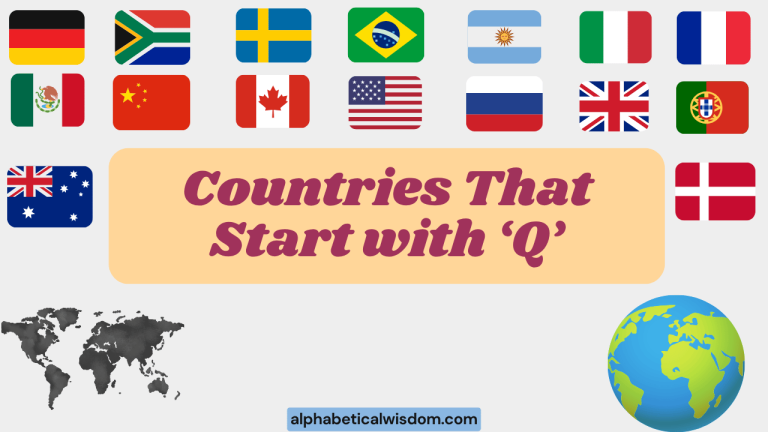Countries That Start With ‘T’: A Grammatical Guide
Understanding how to use country names grammatically is crucial for clear and effective communication in English. This article focuses on countries starting with the letter ‘T,’ exploring their grammatical properties, including proper nouns, articles, and common usage patterns.
Mastering these rules enhances your writing and speaking skills, ensuring accuracy and fluency. This guide is perfect for English language learners, educators, and anyone looking to refine their understanding of English grammar in a specific and practical context.
Table of Contents
- Introduction
- Definition: Countries Starting with ‘T’
- Structural Breakdown: Grammatical Elements
- Types and Categories
- Examples
- Usage Rules
- Common Mistakes
- Practice Exercises
- Advanced Topics
- FAQ
- Conclusion
Definition: Countries Starting with ‘T’
A country, in grammatical terms, functions primarily as a proper noun. Proper nouns are specific names of people, places, or things and are always capitalized in English. Countries starting with ‘T’ are no exception. These names identify distinct political entities, each with its own geographical boundaries, government, and population. Understanding their grammatical role is essential for constructing grammatically correct and meaningful sentences.
The term “country” itself refers to a nation with its own government, occupying a particular territory. When we discuss countries in a grammatical context, we’re concerned with how these names are used in sentences – their capitalization, their interaction with articles (the, a, an), and the prepositions that commonly accompany them. The grammatical properties of country names are consistent regardless of the specific letter they begin with; however, focusing on countries starting with ‘T’ provides a concrete set of examples to illustrate these principles.
Furthermore, it’s important to note that the political landscape can change over time. New countries may emerge, borders may shift, and names may be altered.
Therefore, staying updated on current geopolitical information is crucial for accurate grammatical usage. For instance, a region previously recognized as a territory might gain independence and become a sovereign state, thus affecting how it’s referred to grammatically.
Structural Breakdown: Grammatical Elements
The grammatical structure involving country names is relatively straightforward. The key elements to consider are capitalization, the use of articles, and the selection of appropriate prepositions.
Proper nouns, like country names, always begin with a capital letter. This rule is fundamental and applies universally.
The use of articles is more nuanced. Most country names do not require an article.
However, there are exceptions. For example, country names that include words like “Republic,” “Kingdom,” or “States” often take the definite article “the.” Understanding these exceptions is crucial for grammatical accuracy.
Prepositions are used to indicate the relationship between the country name and other elements in the sentence. Common prepositions used with country names include in, to, from, and of. The choice of preposition depends on the context and the specific relationship being expressed. For example, “I live in Tanzania” indicates location, while “I traveled to Thailand” indicates direction.
Adjectives derived from country names are also important. These adjectives are used to describe people, things, or ideas associated with the country.
For example, the adjective for Thailand is “Thai.” These adjectives also follow capitalization rules, beginning with a capital letter. Understanding how to form and use these adjectives expands your vocabulary and improves your ability to describe things accurately.
Types and Categories
Sovereign States
Sovereign states are independent countries with their own governments and recognized boundaries. These are the primary entities we typically think of when discussing countries.
Examples of sovereign states starting with ‘T’ include Thailand, Tanzania, and Turkey. These countries have full control over their internal and external affairs and are recognized as independent actors in the international community.
Grammatically, sovereign states are treated as proper nouns and are always capitalized. They usually do not require a definite article unless the name includes words like “Republic” or “Kingdom.” For instance, we say “I visited Tanzania” but “I visited the Czech Republic.” Understanding this distinction is crucial for accurate usage.
Dependent Territories
Dependent territories are regions that are under the jurisdiction of another country. They may have some degree of self-governance but are ultimately controlled by the governing nation.
While there are relatively few dependent territories starting with ‘T’, it’s important to recognize their existence and understand how they are referred to grammatically.
The grammatical treatment of dependent territories is similar to that of sovereign states. They are treated as proper nouns and are always capitalized. However, the relationship between the territory and the governing country may be expressed using prepositions like of or in. For example, “Tokelau is a territory of New Zealand.”
Examples
Sovereign States Examples
The following table provides examples of sovereign states starting with ‘T’ and their corresponding adjectives.
| Country | Adjective | Example Sentence |
|---|---|---|
| Taiwan | Taiwanese | She speaks Taiwanese Mandarin fluently. |
| Tajikistan | Tajikistani | He is a Tajikistani citizen. |
| Tanzania | Tanzanian | We enjoyed Tanzanian coffee. |
| Thailand | Thai | I love Thai food. |
| Timor-Leste | Timorese | The Timorese culture is rich and diverse. |
| Togo | Togolese | The Togolese government is working on improving education. |
| Tonga | Tongan | He is a Tongan rugby player. |
| Trinidad and Tobago | Trinidadian/Tobagonian | She is a Trinidadian writer. |
| Tunisia | Tunisian | We visited a Tunisian market. |
| Turkey | Turkish | He speaks Turkish fluently. |
| Turkmenistan | Turkmen | The Turkmen carpets are famous worldwide. |
| Tuvalu | Tuvaluan | The Tuvaluan culture is unique. |
| The Bahamas | Bahamian | She is a Bahamian artist. |
| The Gambia | Gambian | We tried Gambian cuisine. |
| The Marshall Islands | Marshallese | The Marshallese people are known for their hospitality. |
| The Federated States of Micronesia | Micronesian | He is a citizen of The Federated States of Micronesia |
| The Netherlands | Dutch | She speaks Dutch fluently. |
| The Philippines | Filipino | I love Filipino culture. |
| The Solomon Islands | Solomon Islander | He is a Solomon Islander from Honiara. |
| The United Kingdom | British | She is a British citizen. |
| The United States | American | He is an American football player. |
| The Czech Republic | Czech | She is a Czech dancer. |
| The Dominican Republic | Dominican | He is a Dominican baseball player. |
| The Central African Republic | Central African | She is a Central African doctor. |
| The Democratic Republic of the Congo | Congolese | He is a Congolese musician. |
| The Republic of Korea | Korean | She is a Korean actress. |
| The Republic of Ireland | Irish | He is an Irish writer. |
| The Ivory Coast | Ivorian | She is an Ivorian model. |
| The Vatican City | Vatican | He is a citizen of The Vatican City |
| The Comoros | Comorian | She is a Comorian artist. |
Dependent Territories Examples
While there are limited examples of dependent territories starting with ‘T’, here are a couple of examples:
| Territory | Governing Country | Example Sentence |
|---|---|---|
| Tokelau | New Zealand | Tokelau is administered by New Zealand. |
| Turks and Caicos Islands | United Kingdom | The Turks and Caicos Islands are a British Overseas Territory. |
Examples in Sentences
This table illustrates the use of country names starting with ‘T’ in various sentence structures.
| Sentence | Grammatical Note |
|---|---|
| I am planning a trip to Thailand next year. | Direct use of the country name as the object of the preposition “to.” |
| Tanzania’s wildlife is breathtaking. | Use of the possessive form to indicate ownership. |
| She is studying Turkish history at the university. | Use of the adjective form to describe a subject. |
| The capital of Turkey is Ankara. | Country name used as the subject of the sentence. |
| He moved from Taiwan to the United States. | Country names used with the preposition “from” to indicate origin. |
| We enjoyed the Tongan dance performance. | Adjective form used to describe the type of dance. |
| She works for a Tunisian company. | Adjective form used to describe the company’s origin. |
| The flight to Togo was delayed. | Country name used as the object of the preposition “to.” |
| Trinidad and Tobago are known for their vibrant culture. | Compound country name used as the subject of the sentence. |
| They explored the ancient ruins in Tajikistan. | Country name used as the object of the preposition “in.” |
| The Turkmen horses are a national symbol. | Adjective form used to describe the horses. |
| Tuvalu is facing challenges due to rising sea levels. | Country name used as the subject of the sentence. |
| He is a citizen of The Bahamas. | Use of country name with “the” as it is part of the official name. |
| She visited The Gambia during her travels in Africa. | Use of country name with “the” as it is part of the official name. |
| Many people visit The Marshall Islands to enjoy the beaches. | Use of country name with “the” as it is part of the official name. |
| He is studying the culture of The Federated States of Micronesia. | Use of country name with “the” as it is part of the official name. |
| She is from The Netherlands. | Use of country name with “the” as it is part of the official name. |
| The cuisine of The Philippines is very diverse. | Use of country name with “the” as it is part of the official name. |
| The capital of The Solomon Islands is Honiara. | Use of country name with “the” as it is part of the official name. |
| The royal family of The United Kingdom is famous. | Use of country name with “the” as it is part of the official name. |
| The president of The United States gave a speech. | Use of country name with “the” as it is part of the official name. |
| The flag of The Czech Republic is red, white, and blue. | Use of country name with “the” as it is part of the official name. |
| The beaches of The Dominican Republic are beautiful. | Use of country name with “the” as it is part of the official name. |
| The economy of The Central African Republic is growing. | Use of country name with “the” as it is part of the official name. |
| The people of The Democratic Republic of the Congo are friendly. | Use of country name with “the” as it is part of the official name. |
| The music of The Republic of Korea is popular. | Use of country name with “the” as it is part of the official name. |
| The traditions of The Republic of Ireland are rich. | Use of country name with “the” as it is part of the official name. |
| The culture of The Ivory Coast is fascinating. | Use of country name with “the” as it is part of the official name. |
| The art of The Vatican City is world-renowned. | Use of country name with “the” as it is part of the official name. |
| The history of The Comoros is unique. | Use of country name with “the” as it is part of the official name. |
Usage Rules
Capitalization Rules
As proper nouns, all country names starting with ‘T’ must be capitalized. This rule applies to both sovereign states and dependent territories. For example, Thailand, Tanzania, Turkey, Tokelau, and Turks and Caicos Islands must always be capitalized.
The capitalization rule extends to adjectives derived from these country names. For instance, Thai, Tanzanian, and Turkish are all capitalized. This ensures consistency and clarity in writing.
Use of Articles
Most country names do not require the definite article “the.” For example, we say “I visited Thailand,” not “I visited the Thailand.” However, there are exceptions to this rule. Country names that include words like “Republic,” “Kingdom,” or “States” often take the definite article “the.”
Consider these examples:
- Correct: I visited the Czech Republic.
- Incorrect: I visited Czech Republic.
- Correct: I visited the United States.
- Incorrect: I visited United States.
The presence of “the” is part of the official name for some countries and territories. Using or omitting it incorrectly would be a grammatical error.
Prepositions with Country Names
The choice of preposition depends on the context. Common prepositions used with country names include in, to, from, and of.
Here are some examples:
- In: I live in Tanzania. (Indicates location)
- To: I traveled to Thailand. (Indicates direction)
- From: She is from Turkey. (Indicates origin)
- Of: The president of Turkey is visiting. (Indicates association)
The preposition “of” is often used to indicate possession or association, while “in” indicates location within the country. “To” indicates movement towards the country, and “from” indicates origin or departure.
Forming Adjectives from Country Names
Adjectives derived from country names are used to describe people, things, or ideas associated with the country. These adjectives are also capitalized.
For example:
- Thailand: Thai (Thai food)
- Tanzania: Tanzanian (Tanzanian coffee)
- Turkey: Turkish (Turkish carpet)
These adjectives help to provide more specific information about the noun they modify. It is important to use the correct adjective form to maintain clarity and accuracy.
Common Mistakes
One common mistake is failing to capitalize country names. Remember that country names are proper nouns and must always be capitalized.
Another common mistake is using the incorrect article. Remember that most country names do not require an article, but those including words like “Republic,” “Kingdom,” or “States” usually do.
Here are some examples of common mistakes and their corrections:
| Incorrect | Correct | Explanation |
|---|---|---|
| i want to visit thailand. | I want to visit Thailand. | Capitalization error. |
| I visited the Tanzania. | I visited Tanzania. | Incorrect use of the article “the.” |
| She is from the Turkey. | She is from Turkey. | Incorrect use of the article “the.” |
| He speaks thai language. | He speaks Thai. | Capitalization error of the adjective “Thai”. |
| I love tanzanian coffee. | I love Tanzanian coffee. | Capitalization error of the adjective “Tanzanian”. |
| I live in the Czech republic. | I live in the Czech Republic. | Capitalization error in the name of the country “Czech Republic” |
| I want to go to the united states. | I want to go to the United States. | Capitalization error in the name of the country “United States” |
Practice Exercises
Exercise 1: Correct the Sentences
Correct the following sentences, paying attention to capitalization and article usage.
| Question | Answer |
|---|---|
| 1. she is from the turkey. | 1. She is from Turkey. |
| 2. i want to visit thailand. | 2. I want to visit Thailand. |
| 3. he speaks thai fluently. | 3. He speaks Thai fluently. |
| 4. the capital of czech republic is prague. | 4. The capital of the Czech Republic is Prague. |
| 5. we traveled to the united states. | 5. We traveled to the United States. |
| 6. she enjoys tanzanian coffee. | 6. She enjoys Tanzanian coffee. |
| 7. he is a citizen of the netherlands. | 7. He is a citizen of The Netherlands. |
| 8. the beaches of dominican republic are beautiful. | 8. The beaches of the Dominican Republic are beautiful. |
| 9. the culture of ivory coast is fascinating. | 9. The culture of the Ivory Coast is fascinating. |
| 10. the traditions of republic of ireland are rich. | 10. The traditions of the Republic of Ireland are rich. |
Exercise 2: Fill in the Blanks
Fill in the blanks with the correct preposition or adjective form.
| Question | Answer |
|---|---|
| 1. I live ____ Tanzania. | 1. in |
| 2. She is ____ Thailand. | 2. from |
| 3. He speaks ____ fluently. (Turkey) | 3. Turkish |
| 4. The capital ____ the Czech Republic is Prague. | 4. of |
| 5. We traveled ____ the United States. | 5. to |
| 6. She enjoys ____ coffee. (Tanzania) | 6. Tanzanian |
| 7. He is a citizen ____ The Netherlands. | 7. of |
| 8. The beaches ____ the Dominican Republic are beautiful. | 8. of |
| 9. The culture ____ the Ivory Coast is fascinating. | 9. of |
| 10. The traditions ____ the Republic of Ireland are rich. | 10. of |
Advanced Topics
Idiomatic Expressions
Idiomatic expressions involving country names are relatively rare, but they do exist. These expressions often carry cultural or historical significance.
Understanding these idioms can enhance your comprehension of nuanced language use.
For example, while not directly related to countries starting with “T,” consider the phrase “Dutch courage,” referring to courage gained from alcohol. This idiom reflects a historical association with the Netherlands.
Similarly, exploring idioms related to countries like Turkey or Thailand can provide deeper cultural insights.
Historical and Cultural Contexts
Understanding the historical and cultural contexts of country names can further enrich your grammatical understanding. The names of countries often reflect significant historical events, cultural influences, or linguistic origins.
Exploring these contexts can provide a deeper appreciation for the language and the world.
For instance, the name “Thailand” means “Land of the Free,” reflecting its historical independence. The name “Turkey” is derived from the Turkish people who have inhabited the region for centuries.
Understanding these etymological and historical connections can add depth to your linguistic knowledge.
FAQ
- Why is it important to capitalize country names?
Capitalizing country names is essential because they are proper nouns. Proper nouns are specific names of people, places, or things, and capitalizing them distinguishes them from common nouns. This helps to ensure clarity and accuracy in writing.
- When should I use the article “the” before a country name?
You should use the article “the” before a country name if it includes words like “Republic,” “Kingdom,” or “States,” or if “the” is part of the official name of the country. For example, “the Czech Republic,” “the United States,” and “The Bahamas.”
- What prepositions are commonly used with country names?
Common prepositions used with country names include in, to, from, and of. The choice of preposition depends on the context and the relationship you want to express.
- How do I form adjectives from country names?
Adjectives are formed from country names to describe people, things, or ideas associated with the country. For example, “Thai” (from Thailand), “Tanzanian” (from Tanzania), and “Turkish” (from Turkey). These adjectives are also capitalized.
- What are some common mistakes to avoid when using country names?
Common mistakes include failing to capitalize country names, using the incorrect article (“the”), and using the wrong preposition. Always double-check your capitalization and article usage to ensure accuracy.
- Are dependent territories treated differently grammatically than sovereign states?
Dependent territories are generally treated similarly to sovereign states grammatically. They are capitalized as proper nouns, but the relationship to the governing country may be expressed using prepositions like of or in.
- Can country names change over time?
Yes, country names can change over time due to political changes, border shifts, or linguistic reforms. It’s important to stay updated on current geopolitical information to ensure accurate grammatical usage.
- Why do some country names have multiple words?
Some country names have multiple words due to historical reasons, political unions, or geographical descriptions. These names should be treated as a single proper noun and capitalized accordingly. Example: Trinidad and Tobago, The Federated States of Micronesia.
- Is it always necessary to use the official long-form name of a country?
No, it is not always necessary. In many cases, the short-form name is perfectly acceptable and more common. However, in formal documents or when clarity is crucial, using the official long-form name may be preferable. For example, using “United Kingdom” instead of “UK” in a legal document.
- How does the use of “the” with a country name affect its meaning or formality?
Using “the” when it is part of the official name is a grammatical requirement. Omitting it would be incorrect. However, using “the” when it is not part of the official name can sometimes add a sense of formality or specificity, though it is generally avoided unless grammatically required.
Conclusion
Understanding the grammatical rules governing country names, especially those starting with ‘T,’ is crucial for effective communication in English. This article has covered key aspects such as capitalization, article usage, preposition selection, and adjective formation.
By mastering these rules, you can enhance your writing and speaking skills, ensuring accuracy and clarity.
Remember to always capitalize country names as proper nouns and pay attention to the use of articles, especially for countries with names including “Republic,” “Kingdom,” or “States.” Practice using the correct prepositions and adjective forms to describe people, things, or ideas associated with these countries. By consistently applying these principles, you can avoid common mistakes and communicate with confidence.
Continue to expand your knowledge by exploring idiomatic expressions and historical contexts related to different countries. This will not only improve your grammatical skills but also deepen your understanding of the world.
Keep practicing and refining your skills, and you will become a more proficient and articulate English speaker and writer.
